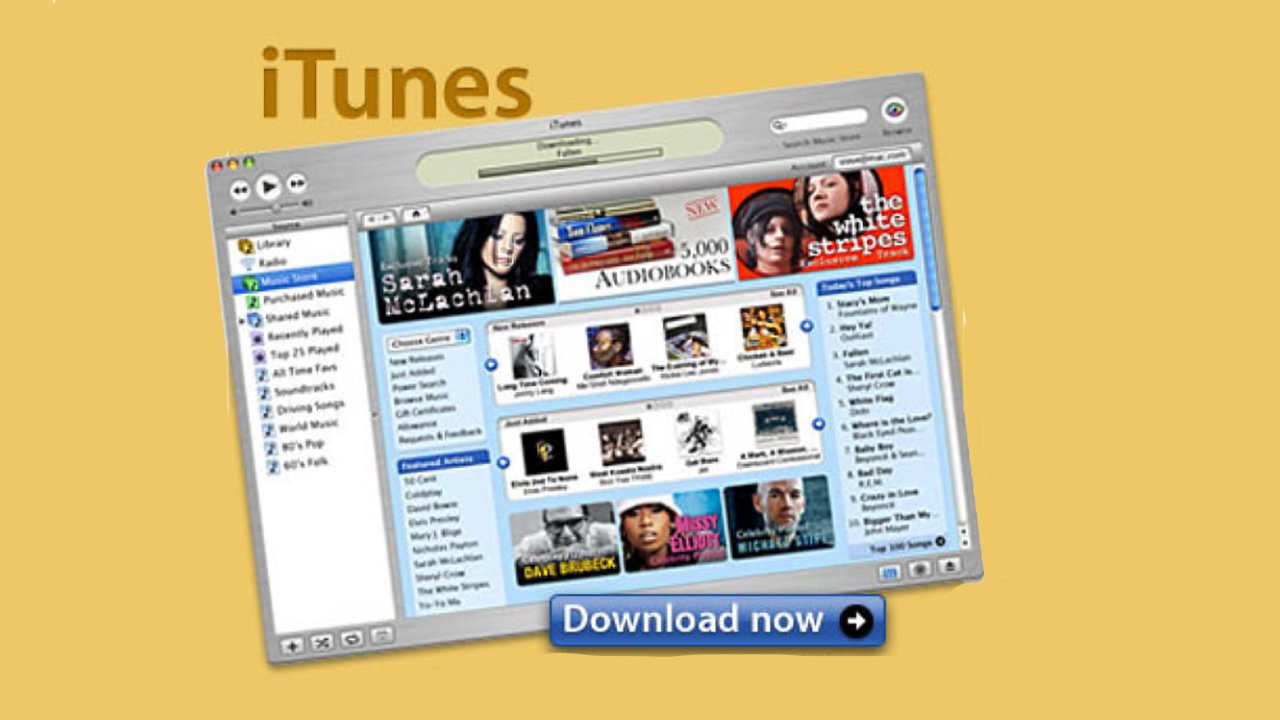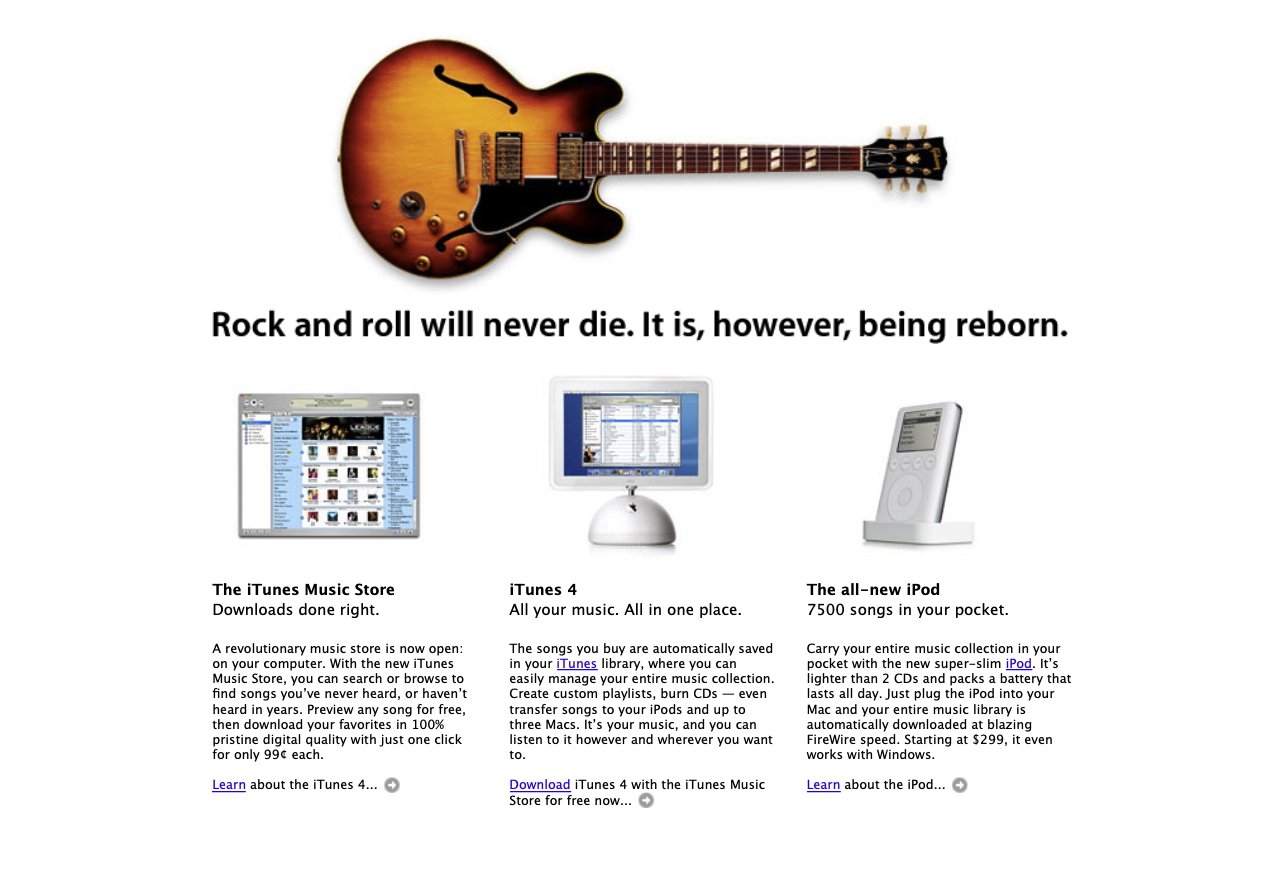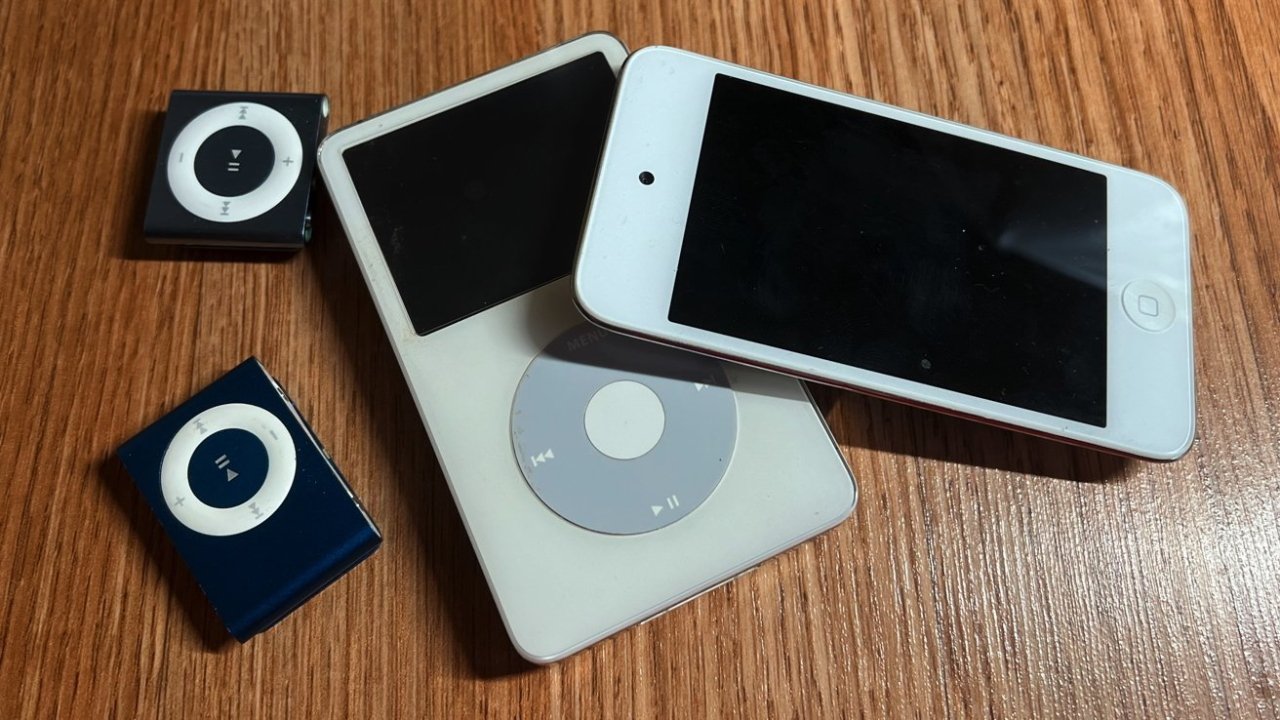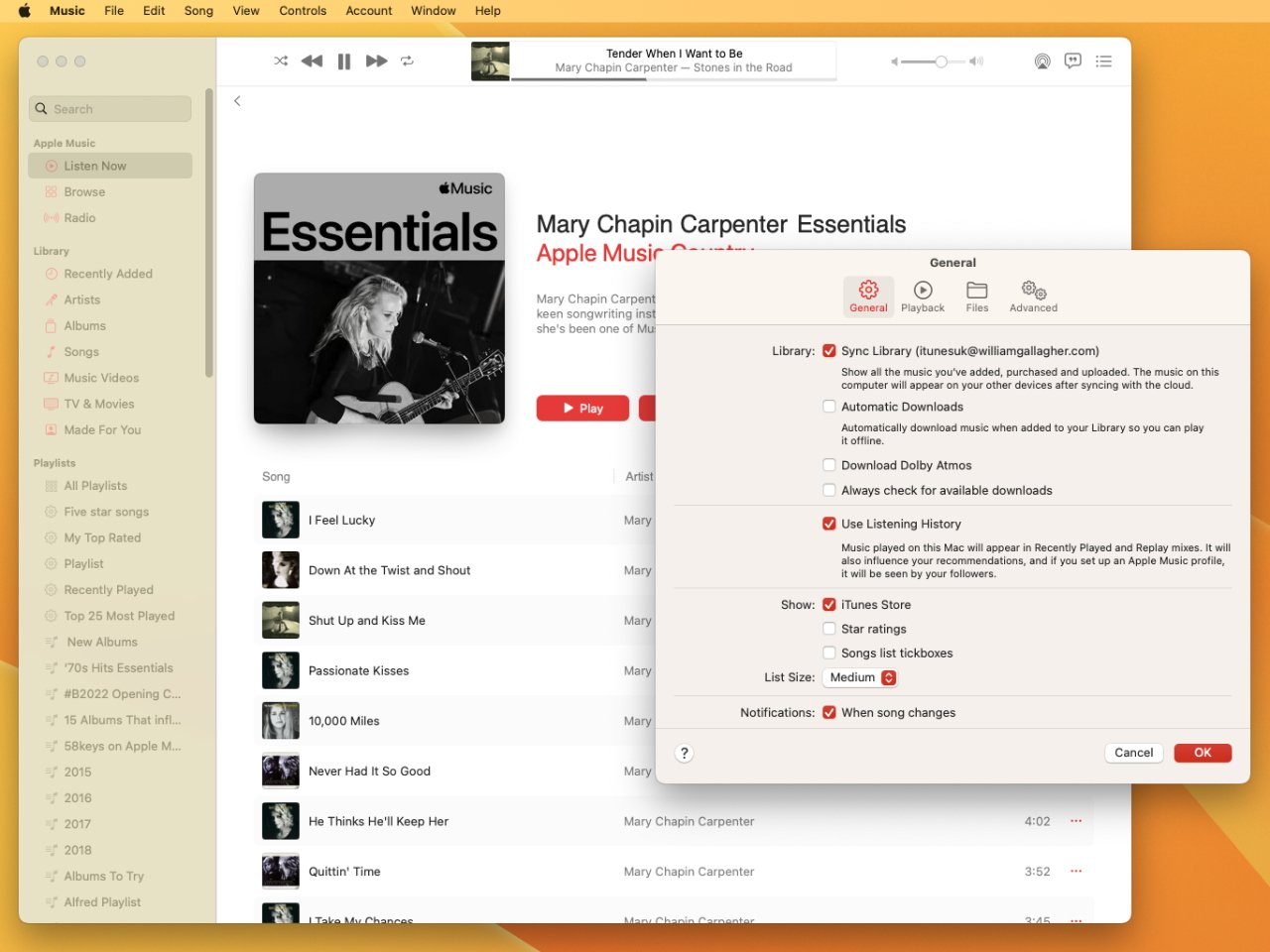Music changed forever with Apple's iTunes Music Store 20 years ago
On April 28, 2003, Steve Jobs announced the iTunes Music Store with 200,000 songs and a few exclusives that not only changed the record industry then, it paved the way to today's streaming.

An early promo for the iTunes Music Store
It's unlikely that you have said or thought the word "iTunes" in at least a couple of years. Back in 2021, Apple broke up the iTunes app into separate ones for music, tv and so on, and it was right to do so because it had become peculiarly confusing.
There's much to still be confused about, too, as iTunes has been split up, but the iTunes Music Store still exists. Apple has just gone to some lengths to hide what was once such an important part of its business.
The iTunes Music Store took iTunes, the little music-playing app, and turned it into a way to discover new music -- and to buy it, too. Today buying music a track at a time seems oddly antiquated, but back in 2003, it was a seismic change for both music buyers and for record labels.

One of Apple's earliest promotions of the iTunes Music Store
"We had an inkling it would have repercussions," Vega told Spin magazine in May 2010. "It both freed music and destroyed the industry."
Up to the rise of the MP3 digital file, music had been sold in various physical media culminating in the CD. It was a good time for the record industry, especially when people would buy CD versions of vinyl albums they already had.
However, it's fair to say that the record labels knew the real money was in physical distribution. They were very conscious that MP3 could be copied, they were seeing Napster and similar services do exactly that, but to them it seemed like online meant piracy, where physical media meant profits.
What Steve Jobs worked to do was convince them that not only was there a middle ground, but that it was a gigantic middle ground. He argued that most piracy was being done then by people who would pay for digital music if they could.
There will always be people who'll pirate music no matter what, but Jobs believed that the majority were downloading illegally because it was convenient, not because it was free.
"Consumers don't want to be treated like criminals and artists don't want their valuable work stolen," wrote Steve Jobs in Apple's announcement of the store. "The iTunes Music Store offers a groundbreaking solution for both."
Or at least, while it had introduced the iPod in October 2001, and it did have the iMac, Apple wasn't remotely as profitable as it would become. To this day, Mac sales represent only a fraction of the PC-dominated market, but in 2003, it was a minuscule fraction.
That is the real reason that Apple was able to create the iTunes Music Store. Apple was offering record labels a way to test the truth of Jobs's claims, without the expense of committing to their own online services.
If Jobs was wrong, if there was no change and all music downloads remained illegal, then they could just withdraw from the iTunes Music Store. It wouldn't cost them anything in terms of servers or teams or infrastructure.
There wouldn't even really be an impact on their reputations, since it was Apple that was attempting to run the store.
And perhaps above all else, Apple was aiming it exclusively at Mac users. The wider PC-using market would not even see this little test.
This is how Apple managed to get the then Big Five record labels to agree to the service. They agreed as long as their music was protected with digital rights management (DRM), but they agreed.

The iPod drove sales on the iTunes Music Store, and vice versa
Even then, it wasn't always an easy road, and negotiations had to keep happening. But the short version is that the iTunes Music Store opened with a fifth of a million songs available to buy instantly.
"This is very strange to me," wrote Bill Gates in a Microsoft memo later revealed in an unrelated court case. "The music companies['] own operations offer a service that is truly unfriendly to the user and has been reviewed that way consistently. Somehow they decide to give Apple the ability to do something pretty good."
"Now that Jobs has done it we need to move fast to get something where the UI and Rights are as good," Gates continued. "I am not sure whether we should do this through one of these JVs or not."
"I am not sure what the problems are," he wrote. "However I think we need some plan to prove that even though Jobs has us a bit flat footed again we move quick and both match and do stuff better."
So Apple got the record labels to consider online music when, seemingly, Microsoft had not. Then the iTunes Music Store was sufficiently successful that the labels agreed to it becoming available on the PC, and then it was enormously successful.
Yet even with a proven example that it worked, Microsoft still struggled. It launched MSN Music in 2004 -- and shuttered it in 2008, in favor of the Zune Marketplace.
All the while, the iTunes Music Store kept going, kept earning money, and kept on adding music.
It didn't lose money, though. Reportedly within its first few months, the iTunes Music Store was selling enough to pay for its operating costs. And then Apple would regularly get to boast about another milestone being passed.
In February 2013, for one example, right on the eve of its 10th anniversary, the iTunes Music Store sold its 25 billionth song.
It looked like there was no stopping the iTunes Music Store.
Spotify had launched in 2011, and Apple Music was Apple's answer both to that and to declining music sales. Apple Music still lags behind Spotify in terms of listeners, and it took four years to reach 60 million subscribers.
Apple rarely reveals Apple Music subscriber figures, but that 60 million total was quoted by Apple's Eddy Cue in 2019. Asked later about the splitting up of the iTunes app, he said it was necessary to move to streaming.
"I worked so much on iTunes and Apple Music, I'm biased," he admitted, continuing, "Of course I'm fond of iTunes, but I think Apple Music is absolutely better in every way. We have something better now and there is no point in looking back."

It's no longer even available by default, you have to choose to enable the iTunes Music Store
And maybe that ease and convenience, maybe that sheer enormous volume of available music, has made us move on from the iTunes Music Store.
Yet Apple hasn't exactly kept the store front and center. You could even be surprised to know that it still exists, but it does.
If you can find it.
And in a brutally unscientific test, one AppleInsider writer managed to mangle his multiple Apple IDs and lock himself out of his Apple Music account. Despite more than 10 years of buying music, the only thing he could find in his library was that wretched U2 album Apple gave away for free in 2014.

One it's enabled, you have to start a search and then click the iTunes Store button
You know you've got your library backed up somewhere. But it's probably in the loft with your vinyl, or in the den where you think you last saw your CDs.
Twenty years on, the iTunes Music Store might as well be dead. Yet without it unlocking the record labels, without it introducing the entire idea of playing music on a computer or an iPhone, we would not have what we do today.
"Whatever anyone says about Apple, if it wasn't for Steve Jobs there would be no legitimate music online," Jimmy Iovine said back in 2009, "I think his impact on music has been extraordinary."
Read on AppleInsider

An early promo for the iTunes Music Store
It's unlikely that you have said or thought the word "iTunes" in at least a couple of years. Back in 2021, Apple broke up the iTunes app into separate ones for music, tv and so on, and it was right to do so because it had become peculiarly confusing.
There's much to still be confused about, too, as iTunes has been split up, but the iTunes Music Store still exists. Apple has just gone to some lengths to hide what was once such an important part of its business.
The iTunes Music Store took iTunes, the little music-playing app, and turned it into a way to discover new music -- and to buy it, too. Today buying music a track at a time seems oddly antiquated, but back in 2003, it was a seismic change for both music buyers and for record labels.

One of Apple's earliest promotions of the iTunes Music Store
Back in the day
Apple did not invent the playing of music on computers, and it did not invent the MP3 format that enabled it. That was invented in the '80s by Karlheinz Brandenburg, an engineer in Germany who famously iterated his invention until it could successfully play Suzanne Vega's a cappella track, "Tom's Diner.""We had an inkling it would have repercussions," Vega told Spin magazine in May 2010. "It both freed music and destroyed the industry."
Up to the rise of the MP3 digital file, music had been sold in various physical media culminating in the CD. It was a good time for the record industry, especially when people would buy CD versions of vinyl albums they already had.
However, it's fair to say that the record labels knew the real money was in physical distribution. They were very conscious that MP3 could be copied, they were seeing Napster and similar services do exactly that, but to them it seemed like online meant piracy, where physical media meant profits.
What Steve Jobs worked to do was convince them that not only was there a middle ground, but that it was a gigantic middle ground. He argued that most piracy was being done then by people who would pay for digital music if they could.
There will always be people who'll pirate music no matter what, but Jobs believed that the majority were downloading illegally because it was convenient, not because it was free.
"Consumers don't want to be treated like criminals and artists don't want their valuable work stolen," wrote Steve Jobs in Apple's announcement of the store. "The iTunes Music Store offers a groundbreaking solution for both."
Apple's small market share saves the day
Steve Jobs was a strong negotiator, but he did also have an advantage then that Apple could not conceive of today. Apple wasn't a success, not then.Or at least, while it had introduced the iPod in October 2001, and it did have the iMac, Apple wasn't remotely as profitable as it would become. To this day, Mac sales represent only a fraction of the PC-dominated market, but in 2003, it was a minuscule fraction.
That is the real reason that Apple was able to create the iTunes Music Store. Apple was offering record labels a way to test the truth of Jobs's claims, without the expense of committing to their own online services.
If Jobs was wrong, if there was no change and all music downloads remained illegal, then they could just withdraw from the iTunes Music Store. It wouldn't cost them anything in terms of servers or teams or infrastructure.
There wouldn't even really be an impact on their reputations, since it was Apple that was attempting to run the store.
And perhaps above all else, Apple was aiming it exclusively at Mac users. The wider PC-using market would not even see this little test.
This is how Apple managed to get the then Big Five record labels to agree to the service. They agreed as long as their music was protected with digital rights management (DRM), but they agreed.

The iPod drove sales on the iTunes Music Store, and vice versa
Even then, it wasn't always an easy road, and negotiations had to keep happening. But the short version is that the iTunes Music Store opened with a fifth of a million songs available to buy instantly.
The iTunes Music Store didn't stay small for long
Despite Apple's advantage of its small size at the time, it shouldn't be underestimated how good Steve Jobs was at negotiating. At that same time, Microsoft was trying to launch a music service through partnerships and joint ventures with firms including record labels, and it was not going well."This is very strange to me," wrote Bill Gates in a Microsoft memo later revealed in an unrelated court case. "The music companies['] own operations offer a service that is truly unfriendly to the user and has been reviewed that way consistently. Somehow they decide to give Apple the ability to do something pretty good."
"Now that Jobs has done it we need to move fast to get something where the UI and Rights are as good," Gates continued. "I am not sure whether we should do this through one of these JVs or not."
"I am not sure what the problems are," he wrote. "However I think we need some plan to prove that even though Jobs has us a bit flat footed again we move quick and both match and do stuff better."
So Apple got the record labels to consider online music when, seemingly, Microsoft had not. Then the iTunes Music Store was sufficiently successful that the labels agreed to it becoming available on the PC, and then it was enormously successful.
Yet even with a proven example that it worked, Microsoft still struggled. It launched MSN Music in 2004 -- and shuttered it in 2008, in favor of the Zune Marketplace.
All the while, the iTunes Music Store kept going, kept earning money, and kept on adding music.
Milestones and money
"The iPod makes money," Apple's Phil Schiller said in Owen W. Linzmayer in the 2004 "Apple Confidential 2.0" book, "the iTunes Music Store doesn't."It didn't lose money, though. Reportedly within its first few months, the iTunes Music Store was selling enough to pay for its operating costs. And then Apple would regularly get to boast about another milestone being passed.
In February 2013, for one example, right on the eve of its 10th anniversary, the iTunes Music Store sold its 25 billionth song.
It looked like there was no stopping the iTunes Music Store.
Moving to streaming
In 2015, Apple launched the subscription Apple Music service.Spotify had launched in 2011, and Apple Music was Apple's answer both to that and to declining music sales. Apple Music still lags behind Spotify in terms of listeners, and it took four years to reach 60 million subscribers.
Apple rarely reveals Apple Music subscriber figures, but that 60 million total was quoted by Apple's Eddy Cue in 2019. Asked later about the splitting up of the iTunes app, he said it was necessary to move to streaming.
"I worked so much on iTunes and Apple Music, I'm biased," he admitted, continuing, "Of course I'm fond of iTunes, but I think Apple Music is absolutely better in every way. We have something better now and there is no point in looking back."

It's no longer even available by default, you have to choose to enable the iTunes Music Store
Lest we forget
Somehow Apple Music has made it easy to lose sight of what we've bought in our libraries and what is solely streaming. It is ridiculously easy to listen to a new artist on a whim, or to build up massive collections of music -- so long as you keep paying your subscription.And maybe that ease and convenience, maybe that sheer enormous volume of available music, has made us move on from the iTunes Music Store.
Yet Apple hasn't exactly kept the store front and center. You could even be surprised to know that it still exists, but it does.
If you can find it.
How to get to the iTunes Music Store on Mac
- Open the Music app
- Choose the Music menu, then Settings
- Click on General
- Tick Show iTunes Store
- Click OK
- Search for a track in the Music app's search bar
- Find and click on the iTunes Store button at far right
- Wait and wait and wait
And in a brutally unscientific test, one AppleInsider writer managed to mangle his multiple Apple IDs and lock himself out of his Apple Music account. Despite more than 10 years of buying music, the only thing he could find in his library was that wretched U2 album Apple gave away for free in 2014.

One it's enabled, you have to start a search and then click the iTunes Store button
You know you've got your library backed up somewhere. But it's probably in the loft with your vinyl, or in the den where you think you last saw your CDs.
Twenty years on, the iTunes Music Store might as well be dead. Yet without it unlocking the record labels, without it introducing the entire idea of playing music on a computer or an iPhone, we would not have what we do today.
"Whatever anyone says about Apple, if it wasn't for Steve Jobs there would be no legitimate music online," Jimmy Iovine said back in 2009, "I think his impact on music has been extraordinary."
Read on AppleInsider


Comments
Oh, and don't forget good old iTunes Match that still exists and is a pretty good value and alternative to Apple Music. Your collection need not be squirreled away, but for $25/yr, you can stick with that for significant savings over the AM subscription fee. I use Match myself because of the savings. YMMV.
I would agree that the new music app does make it harder to curate a large collection. Not a bug for sure - its a feature to get you to give up and pay for AM.
Idea: could Apple sell a lifetime subscription to AM? What price? Could it be for a single device bundled with it (say...on a new HomePod?) or even on a single AppleID? WDYT?
Testify! I have loads of ripped local punk, and it's sweet having it in cloud and available on all devices.
I still buy music from iTunes Store, and view Music as iTunes ... but I also refer to Settings in iOS as System Preferences ...
One of my favorite stories (perhaps someone can confirm) was the reaming Jobs handed out to the MobileMe team. "What is this stuff supposed to do?" When he got no clear answer, he told them all they should be ashamed of themselves for besmirching the company's reputation, and for letting down everyone else in the company. Product abandoned, employees sent to fly cargo planes full rubber dogshit outta hong kong. Savage.
I have not taken the bite of buying songs or subscribing to Apple Music. iTunes and Music are just players for me, and it could be better. I have put my CD music collection in my Mac & iPhone. I have 7,754 songs in my iPhone. Some of thees songs are over an hour long as I like to be able to hear an album in it's entirety without Music screwing it up. Music takes up 44.99 GB on my phone and 67.07 GB on my Mac. My music is bought and paid for.